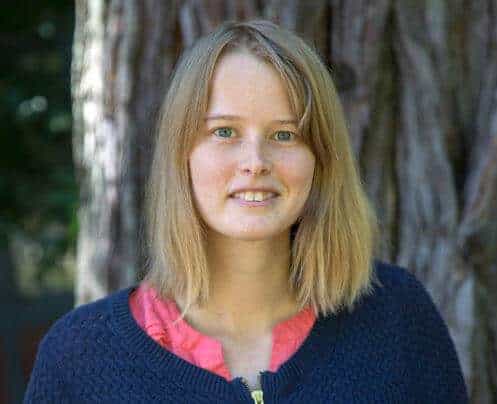UC Santa Cruz doctoral student Sabina Tomkins has long been moved by the horrible stories of victims of human trafficking.
Victims of sexual slavery are subject to inhumane living conditions and psychological and physical abuse. They face starvation and drug addiction as a result of traffickers asserting control. Traffickers are even known to threaten and harm victims’ family members.
“It’s hard to work on anything else because it’s so terrible that it happens,” said Tomkins, who is studying technology and information management.
Tomkins recently researched the link between extreme weather and human trafficking with postdoctoral researcher Golnoosh Farnadi and Professor Lise Getoor at UC Santa Cruz and Brian Amanatullah and Steven Minton at InferLink, a company that specializes in data extraction and integration.
InferLink approached the group at UC Santa Cruz with the problem of how events can impact security, and the team considered examining the effect of extreme weather on migration patterns before settling on human trafficking.
Their work on the link between extreme weather and human trafficking recently won a $300 best paper award at the Beyond Online Data workshop at the International Conference on Weblog and Social Media Data.
The authors wanted the money to be a positive force against trafficking and donated the award to two groups that combat human trafficking, Polaris, and Thorn.
Trafficking is a huge worldwide problem. On any given day in 2016 (when most recent data was available), an estimated 40.3 million people were victims of modern slavery according to the International Labor Organization. An estimated 25 percent of these victims were children.
Traffickers use the aspirations of ordinary people to lure them in as victims. They promise parents that their children are going to a good school abroad or tell young workers that they will get a promising new job.
For their paper, Tomkins and the other researchers first reviewed ads for sexual services on internet sites to see whether certain ethnicities turned up more frequently following Hurricane Matthew in the Caribbean in 2016 and Typhoon Goni in the Philippines in 2015. They found an uptick in ads mentioning Jamaican and Caribbean ethnicities in several Florida cities following the hurricane. They also found an increase in ads mentioning Philippine ethnicities in Dubai. This seems to show that certain populations were more likely to be recruited as prostitutes following the storms.
“These events create vulnerabilities,” Tomkins said. “When you don’t have a home, you can become prey to traffickers who know how to take advantage of it.”
For the next part of the paper, Tomkins reviewed how storms affect where traffickers advertise their services. In Jacksonville, Fla., she found that ads for sexual services dropped on the day of the hurricane.
Finally, Tomkins proposed a predictive model that could anticipate where traffickers might go after a storm and how their movements might change. The model used phone numbers used by traffickers to study their locations.
Lise Getoor, Tomkins’ adviser, praised Tomkins for her intense and careful work integrating disparate data from different places. Her paper makes an important contribution to fighting human trafficking, she said.
“That can give us clues on how we safeguard people better and how we prevent this from happening,” Getoor said.
Tomkins is defending her thesis at the end of this month and then heads to Harvard University for a post-doctoral fellowship “working on algorithmic and machine learning methods for use in constructing mobile health interventions.”
She said she will be investigating interventions for people using a mobile health app for smart phones. As an example, an app could send someone trying to get over the flu reminders to sleep, eat right and get their medicine.
Tomkins said it’s another way she is using data science to help promote social good. She has also worked on ways to detect cyber bullying on social media, understand the effectiveness of online educational programs for high school students, and recommend systems for sustainable product choices.
Tomkins has been interested in data science since she was an undergrad because it gives offers “sanity checks.”
“You never know if you’re right if you’re theorizing,” she said. “It’s nice to be able to track things with data and to be basing your theories on something you see.”


